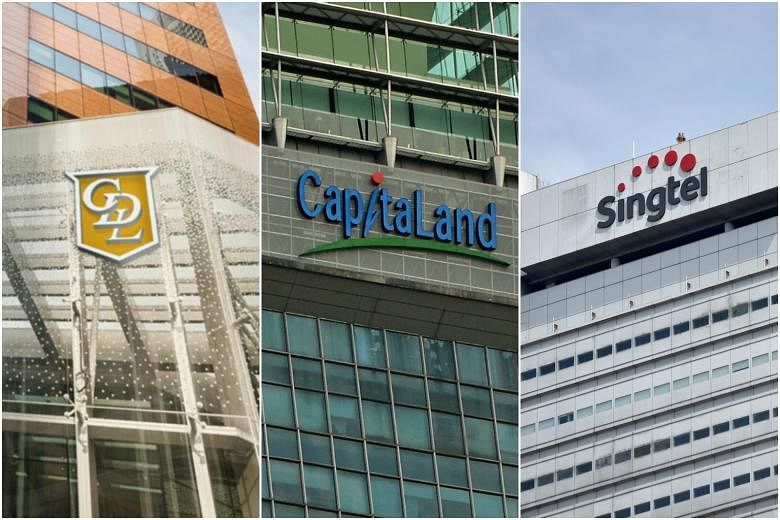SINGAPORE - Three Singapore companies made it to this year's list of the world's 100 most sustainable big corporations, up from two in 2019.
Property developers City Developments (CDL)and CapitaLand came in 36th and 63rd respectively, slipping from 25th and 33rd the previous year. Telco Singtel rejoined the list at 95th place, after dropping out last year. It took 63rd place in 2018.
The Global 100 list ranks large corporations across the globe on metrics like reducing carbon and waste, "clean revenue", CEO-to-average-worker-pay ratio and board gender diversity. In its 16th year, the ranking is compiled by Corporate Knights, a Toronto-based sustainable-business magazine and research company.
Its "clean revenue" metric, which counts for 50 per cent of each company's score, measures the percentage of revenue earned from products or services that have environmental, or well-defined social benefits.
This year's top 100 was selected from a pool of 7,395 publicly listed companies with more than US$1 billion (S$1.35 billion) in revenue, each assessed relative to its industry peers using publicly available information.
CDL was first and CapitaLand second among the 229 real estate firms in the study, while Singtel was fourth among the 126 companies in its industry group.
Mr Sherman Kwek, CDL group chief executive, said, "Climate change affects all of us and concerted action is needed to mitigate its impact. Beyond delivering financial performance, businesses have a responsibility to their investors, stakeholders and the community to drive environmental stewardship. We are immensely honoured to be recognised as the world's most sustainable real estate company.
CapitaLand's chief sustainability officer Lynette Leong, said: "As one of Asia's largest diversified real estate groups, CapitaLand can effect a greater positive influence through our enlarged portfolio and operations." The group links executive compensation to sustainability targets and reaps "clean revenue" from its green real estate portfolio.
Only 18 companies in this year's Global 100 hail from Asia. Forty-nine are from Europe, while the US and Canada accounted for 29. Latin America boasts just three members on the list, all from Brazil, and South Africa's Standard Bank was the only representative of the African continent.
The list includes 28 companies that were not on the Global 100 last year. BYD - China's biggest electric carmaker - is a new entrant, along with Hong Kong's Vitasoy, evidence that while the world's largest economy lags behind European and North American nations on key sustainability metrics, ESG (environmental, social, governance) issues are starting to gain traction where it will matter most, said the report.
The full rankings were unveiled on the sidelines of this year's World Economic Forum in Davos, Switzerland, which began on Tuesday.
The overall top-ranked company this year is Danish renewable energy provider Orsted. The firm, which a decade ago produced 85 per cent of its energy from fossil fuels and 15 per cent from renewable energy, has reversed that proportion and targets to "essentially become carbon neutral" by 2025.
"Running the company just for profit doesn't make sense, but running it just for a bigger purpose is also not sustainable in the long term. Doing good and doing well must go together," said Orsted CEO Henrik Poulsen in a statement. Since Orsted joined the stock market through the world's second-biggest initial public offering of 2016, the company's value has more than doubled to US$40 billion.
Corporate Knights said an analysis of company age and financial performance of this year's Global 100 firms continues to demonstrate that top sustainability performers tend to last longer and perform better for investors than comparable companies.
The average age of a Global 100 company is 83 years, while the average age of a firm in the MSCI ACWI, a flagship global equity index, is 49 years. From its inception on Feb 1, 2005, to Dec 31, 2019, the Global 100 companies made an annualized net investment return of 7.3 per cent compared to 7 per cent for the MSCI ACWI.
"The Global 100 companies show that companies that put sustainability at their core outlast and outperform the competition," said Toby Heaps, CEO of Corporate Knights.
Last year's top-ranked company - Chr Hansen, a Danish bioscience company that uses "good bacteria" to provide natural means for preserving food, protecting plants and reducing overreliance on antibiotics in livestock farming - ranked number two overall.
Third was another Nordic company, Finland's Neste, an oil refiner that is switching from refining crude oil to using cooking waste and other bio-based materials as a feedstock. Fourth was US technology conglomerate Cisco, which rose 10 places from 14th, thanks to more than US$25 billion in clean revenues from products with environmental core attributes. American software group Autodesk, which came fifth, rose 43 places from its 2019 ranking, now that it uses 99 per cent renewable energy to run its cloud platforms.


